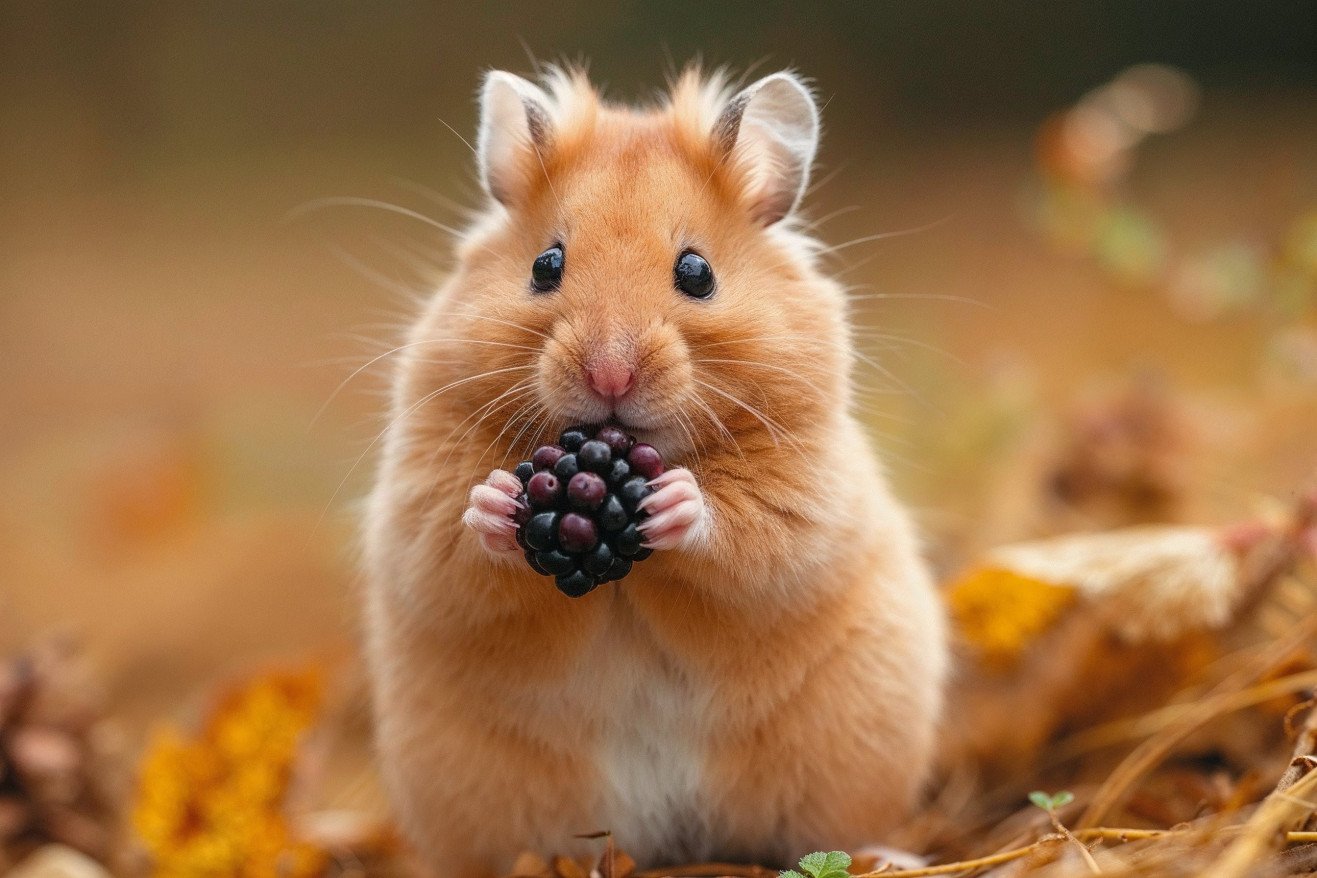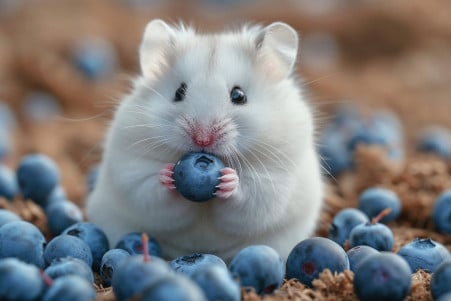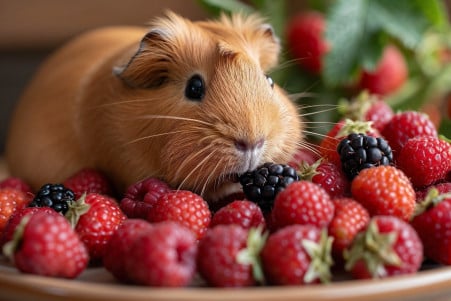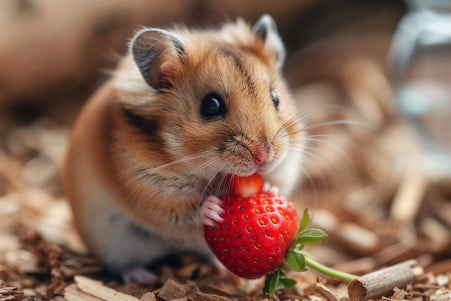Can Hamsters Eat Blackberries? A Nutritional Guide
30 January 2024 • Updated 30 January 2024

If you’ve ever delved into the world of hamster nutrition, you’ve probably come across some interesting questions, like whether or not hamsters can eat blackberries. As it turns out, hamsters can eat blackberries, and they can even benefit from the essential nutrients and antioxidants that blackberries contain.
That said, it’s important to make sure that you only give your hamster one to two small pieces of blackberry two to three times a week to avoid potential problems associated with their high sugar content and the pesticides they may contain.
To better understand how blackberries can be incorporated into a hamster’s diet, this article will review a range of research and expert opinions from the fields of veterinary science, nutrition, and pet care to provide information on hamster digestive physiology, the nutritional content of blackberries, and best feeding practices. By drawing on this interdisciplinary research, we hope to offer evidence-based recommendations that will help you ensure your little pet’s health and happiness.
Can hamsters eat blackberries?
Nutritional Value of Blackberries for Hamsters
Blackberries are not only a superfood for people but also for our little friends. Packed with antioxidants, vitamins, minerals, and fiber, blackberries are an excellent choice for a hamster treat. One of the most important things about blackberries is that they are high in anthocyanin pigments, which are antioxidants that help protect cells, according to Health.com. These compounds are powerful in fighting oxidative stress and can help lower the risk of many diseases.
In addition, blackberries are low in calories, carbs, and fat, which makes them a great fit for a hamster’s diet. As noted by Healthline, one cup of raw blackberries contains important nutrients like vitamin C, vitamin K, and manganese, as well as almost 8 grams of fiber. These nutrients help support a hamster’s overall health by boosting their immune system, helping to keep their bones healthy, and supporting their digestive system.
As a result, blackberries can help a hamster in a number of ways, from supporting their cellular health to providing important vitamins and minerals. Because of this, blackberries can be a nutritious treat that can help support a hamster’s health.
How to Safely Add Blackberries to Your Hamster’s Diet
If you decide to give your hamster blackberries, it’s important to do so carefully to avoid potential health problems. To start, give your hamster very small amounts—like a single blackberry once a week—and work up to every two or three days, according to Pets on Mom. This will help your hamster’s digestive system get used to the new food without causing an upset.
While you’re doing this, watch your hamster for any signs of digestive upset. If you see any issues, you may need to adjust the amount of fruit or take it out of their diet for a while.
Make sure to wash the blackberries thoroughly before giving them to your hamster to remove any pesticide residue that could harm your pet. You can also cut the blackberries into smaller pieces to avoid choking and to make sure you get rid of all the seeds, which can be dangerous for hamsters to eat.
If you follow these steps, you can safely add blackberries to your hamster’s diet, giving them a nutritional boost without risking their well-being.
How to Minimize the Risks: Giving Blackberries to Your Hamster
While blackberries can be a healthy addition to your hamster’s diet, there are some risks to be aware of and steps you can take to minimize them. One of the biggest risks is the sugar content in blackberries. According to Pet Keen, hamsters can develop health problems like obesity and diabetes if they consume too much sugar.
That’s why it’s important to stick to the recommended serving size of ½ teaspoon of blackberries once a week to avoid these issues.
Another risk to consider is pesticide exposure, which can be harmful to your hamster’s health. Oh My Wild suggests washing blackberries thoroughly before giving them to your hamster to reduce this risk. This will help ensure that any pesticide residue is removed and that the blackberries are safe for your hamster to eat.
Because hamsters are so small, choking hazards are also a concern. The seeds in blackberries can pose a choking hazard, so it’s best to mash or cut the blackberries into small pieces that your hamster can easily eat.
Finally, it’s important to monitor your hamster’s stool and weight when you introduce any new food, including blackberries. Dr. Jane Smith, DVM, at Oh My Wild explains that this will help you make sure that your hamster isn’t having any negative effects from the addition of blackberries to their diet. If you follow these guidelines, you can give your hamster blackberries with minimal risk and help them enjoy the nutritional benefits of this fruit.
Why Antioxidants Are Important for Hamster Health
Antioxidants play a critical role in the neutralization of free radicals and the reduction of oxidative stress. Oxidative stress is caused by an imbalance between the body’s production of free radicals and its ability to counteract their damaging effects.
Free radicals are unstable molecules that can cause damage to cells and are linked to a number of health problems. According to Oxbow Animal Health, antioxidants like vitamins E and C and phytonutrients such as flavonoids and carotenoids found in dark leafy greens and some fruits like blackberries are important for reducing oxidative stress.
This is especially important for senior and aging hamsters, who are more likely to experience the health problems that come with old age, which can be made worse by oxidative stress.
It is important to make sure that hamsters are getting a range of antioxidants in their diet to support their overall health.
Research published in PMC has shown that a diet that includes natural antioxidants like those found in blackberries can provide a more complete protection against oxidative stress in hamsters.
Not only does this help to support the hamster’s overall health, but it also helps to ensure that they are getting a well-rounded diet that will help them live longer, healthier lives. As a result, it’s important to understand the importance of antioxidants and to make sure that antioxidant-rich foods like blackberries are included in a hamster’s diet in moderation to help support their health.
Putting Together a Balanced Diet for Your Hamster
Making sure your hamster has a balanced diet is important for its overall health and well-being. For example, A-Z Animals notes that while fruits like blackberries can be a good option, they should make up no more than 10% of a hamster’s diet. This is consistent with the information from The Spruce Pets, which recommends a diet that’s mostly made up of pellets and seeds, with some leafy greens and animal protein.
In addition to blackberries, other fruits that are safe for hamsters to eat include apples (without the seeds), bananas, and blueberries, all of which provide different vitamins and minerals. However, it’s also important to know which foods to avoid feeding your hamster because they can be toxic. For example, The Spruce Pets cautions against feeding hamsters apple seeds, raw beans, raw potatoes, and citrus fruit because they can be toxic or cause digestive upset.
By making sure their diet is well-rounded and includes fruits and other foods that are safe for them, hamster owners can make sure their pets get the nutrients they need. After all, the secret to a happy, healthy hamster isn’t just what they eat, but the variety and balance in their diet that helps them get the most out of life.
Holistic Hamster Care: More Than Just a Berry
While it’s important to make sure your hamster is eating a healthy diet, including blackberries in their treats, holistic care goes beyond what your hamster eats. Regularly checking in on your hamster’s weight and other health factors is important to make sure that you catch any potential health problems early. A-Z Animals notes that a balanced diet is important, but holistic care is about more than what’s in the food bowl.
Making sure that your hamster has a clean and safe home that includes enough bedding to burrow in and toys to chew on can make a big difference in your hamster’s life. These things help your hamster exhibit natural behaviors and keep them from getting bored, which can help keep them healthy.
In addition, making sure that your hamster has access to fresh hay for nesting and eating, and clean water is important for their daily care.
Interacting with your hamster and handling them gently is just as important when it comes to building a good relationship with your pet and making sure that they’re happy and healthy. By making sure that you’re doing all of these things, you can make sure that your hamster is happy and healthy in your care.


